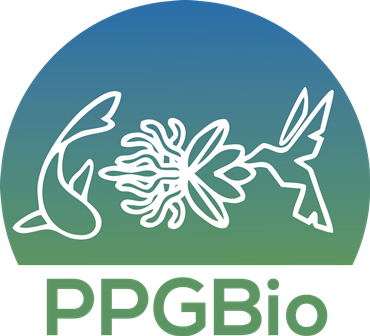History
The Graduate Program in Biodiversity (Recife campus) was established in 2020 through the merger of the Graduate Program in Botany and the Graduate Program in Ecology (approved by Decision No. 157/2020-DAV/CAPES and 007-2021 CONSU/UFRPE).
The PPGB was created in 1976, and in the 1990s, the doctoral program was initiated, making it the pioneering graduate program at UFRPE and the first in Botany in the Northeast of Brazil. Its goal was to contribute to knowledge about the region's flora, and as a result, it has trained hundreds of botanists who are now active throughout the country. The PPGE, in turn, was created in 2009 and started in 2010 with a master's program, with the main objective of training human resources capable of proposing solutions to environmental problems arising from uncontrolled population growth, also focusing on the Brazilian Northeast.
Understanding biodiversity and its interaction processes, dynamics, and maintenance, as well as proposing conservation measures, sustainable use, and the development of alternative and sustainable products for living populations interacting within different ecosystems, are common objectives between the two programs. The merger proposal was developed to form a more cohesive and committed faculty group, working toward a consolidated program that meets the current demands of the region and the country.
CAPES Rating and Scholarships
The program currently holds a CAPES rating 5 and receives scholarships from CAPES, CNPq, and FACEPE (Foundation for the Support of Science and Technology of the State of Pernambuco).
Program Objectives
General Objective:
To train and improve qualified human resources to act as agents in the construction of scientific and socioeconomic knowledge, aiming to understand the processes that generate and maintain biodiversity while promoting environmental governance and sustainable development from an integrative and applied perspective.
Specific Objectives:
-
Train new master's and doctoral researchers in biodiversity studies, from research project development to the dissemination of their results;
-
Provide a foundation for training new faculty members, master’s, and doctoral graduates who can work in various Higher Education Institutions (HEIs), Research Institutes, Foundations, or Research Centers across Brazil;
-
Strengthen emerging research groups in the Northeast of Brazil and consolidate traditional research groups led by experienced and productive faculty members, reducing regional disparities in Brazilian science;
-
Contribute to the advancement of knowledge about Brazil's biota, its conservation, and its sustainable use by human populations;
-
Support the creation and application of technologies capable of assisting in the resolution and mitigation of social, environmental, and economic issues, as well as the impacts of climate change;
-
Expand and consolidate international collaborations between PPG faculty and students with international researchers, ensuring that human resource training and scientific research quality align with global scientific advancements. The program also aims to welcome professionals and students from foreign institutions, promoting lectures, courses, and mentorship opportunities.

